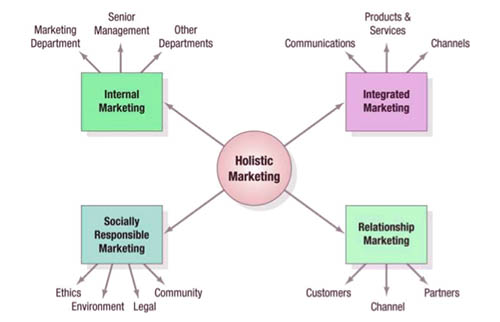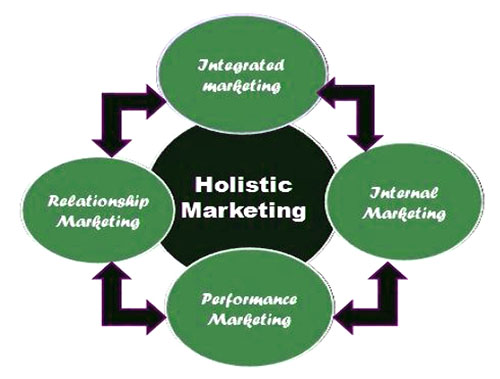The holistic marketing concept looks at marketing as a complex activity and acknowledges that everything matters in marketing. The holistic viewpoint follows that systems in this case marketing somehow function as wholes and that their functioning cannot be fully understood solely in terms of their component parts.
Therefore, a broad and integrated perspective is necessary for developing, designing, and implementing marketing programs and activities. The four components that characterize holistic marketing are relationship marketing, internal marketing, integrated marketing and socially responsive marketing.

- Internal Marketing:
Internal marketing is a process that occurs within a company or organization where the functional process aligns, motivates, and empowers employees at all management levels to deliver a satisfying customer experience. Over recent Year internal marketing has been increasingly integrated with employer branding and employer brand management. which strives to build stronger links between the employee brand experience and customer brand experience. The challenge for internal marketing is not only to get the right messages across. but to embed them in such a way that they both change and reinforce employee behavior.
- Integrated Marketing:
Integrated marketing is an approach to brand communications where the different modes work together to create a seamless experience for the customer and are presented with a similar tone and style that reinforces the brand’s core message. Its goal is to make all aspects of marketing communication (advertising, sales promotion. public relations direct marketing, online communications, and social media) work together as a unified force rather than permitting each to work in isolation, which maxim their cost-effective mess. Integrated marketing is becoming more significant in marketing practice because of the reduced cost-effectiveness of mass media and media fragmentation. As consumers spend more time online and on mobile devices, all exposures of the brand need to tie together so they are more likely to be remembered. Increasingly the strategies to brands cannot be understood by looking solely at their advertising. Instead, the can be understood by seeing how all aspects of their communications system work together particularly how communications are personalized for each customer and react in real time, as in a conversation.
- Relationship Marketing:
Relationship marketing was first developed from direct response marketing campaigns. It is a form of marketing that emphasizes customer retention and satisfaction rather than a dominant focus on sales transactions. As a practice, relationship marketing differs from other forms of marketing in that it -recognize the long-term value of customer relationships and extends communication he and intrusive advertising and sales promotional messages.
- Socially Responsive Marketing:
Socially responsible marketing is a marketing philosophy that states a comp my should take into consideration what is in the best interest of society in the present and long-term. Socially responsible companies should aspire to produce desirable products. Desirable products provide immediate satisfaction and long-term benefits. These products are sought by consumers for immediate gratification and also benefit society and consumers in the long term.
An example of socially responsible marketing would be the advertising of alcoholic drinks when there are no rules or regulations. A beer company that decided to use socially responsible marketing would avoid advertising its products to minors. The company would focus its advertising on late-night television programming or adult magazines that minors are less likely to read.














